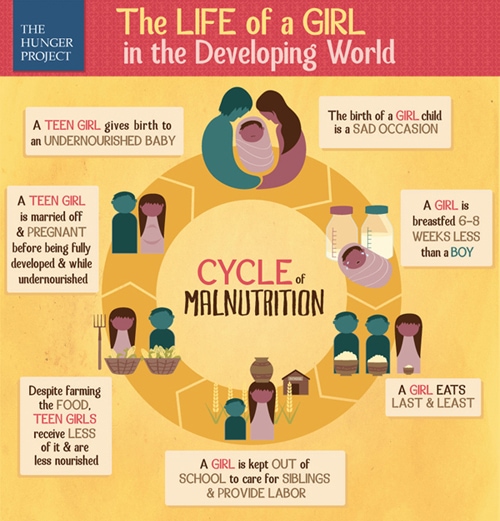In this growing, rapidly expanding world, grassroots change is happening fast and its most powerful catalysts are the committed young people who adapt faster and adopt fully. Which is why, on October 11, the world will celebrate the collective power of the 600 million adolescent girls in the world for International Day of the Girl Child.
This year’s theme, With Her: A Skilled GirlForce, draws attention to the need for educated and innovative young people in the workforce and the enormous segment of the youth population — roughly a quarter, most of them female — who are aren’t enrolled in consistent training or education to better prepare themselves for a self-reliant, fulfilling life.
According to the United Nations, of the 1 billion young people that will enter the workforce in the next decade, “more than 90% of those living in developing countries will work in the informal sector, where low or no pay, abuse and exploitation are common.”
The best tool to lift girls out of these cycles of exploitation is access to education. When young girls are empowered with concrete knowledge, when they aren’t forced to marry, when they are able to achieve their full potential, they create a ripple effect that lasts a lifetime. Empowered girls become empowered women in the workforce who fully leverage their income-generation to improve maternal health, reduce child mortality rates and eradicate malnutrition for entire communities.
What We Do
- Global programs to end child marriage: In 2015, we launched Her Choice, a global coalition that includes The Hunger Project and Netherlands-based organizations Stichting Kinderpostzegels Nederland, International Child Development Initiatives (ICDI) and the University of Amsterdam. Her Choice works to activate local leadership to create an environment in which child marriage is not tolerated. Earlier this year, Her Choice coordinators from six countries (Bangladesh, Benin, Burkina Faso, Ghana, the Netherlands and Uganda) joined 500 girls rights activists from more than 70 countries worldwide for the biggest meeting ever on ending child marriage. After this global three-day event, we leveraged this opportunity to organize a two-day Hunger Project Her Choice workshop to discuss what is going well and what is not, now that we are halfway through the project. Watch the uplifting Girls Not Brides anthem video.
- Advocate for the end of child marriage locally: In Bangladesh, as part of the National Girl Child Advocacy Forum, The Hunger Project joined various government officials and NGOs advocated for a comprehensive sexual harassment prevention law at an exchange meeting organized by the Parliamentary Caucus and Kanyashisu Advocacy Forum for Child Rights at the Parliament House on November 20. See photos and report here.
- Increase awareness of the prevalence of child marriage: The Hunger Project-Ghana ran a “Girls & Boys Camp 2017,” a four-day early child marriage education and awareness program led by Mrs. Patricia Osei Amponsah, project coordinator for Her Choice, for members from the Central & Eastern Regions’ epicenters.
- Increase awareness of the harmful effects of child marriage: At The Hunger Project, we encourage girls to go beyond their comfort zones and challenge existing barriers and stereotypes. Last year, as part of a Girls Leadership Workshops (GLW) The Hunger Project-India led a group of visionary young girls from India’s state of Bihar to the state of Rajasthan on a journey to understand the negative effects of child marriage. This year, their continued amazing work was captured in a beautiful photo essay. It also introduces them to concepts of democracy and citizenship. The need to have effective communication and negotiation skills is reinforced during the workshop to articulate their rights and aspirations in a powerful manner. Overall, 500 girls will participate in GLWs in 2018 in Bihar.
- Promote girls’ safety in schools: In Bangladesh, we have also implemented the “Safe Schools for Girls” program. The program, which runs in partnership with USAID-funded organization International Television Service, seeks to increase girls’ attendance in school, reduce dropouts, improve the quality of education available to girls and promote additional opportunities for girls in and out of school. Watch the inspiring story of one young girl named Lilabati who took agency over her own life and insisting on a comprehensive education.

